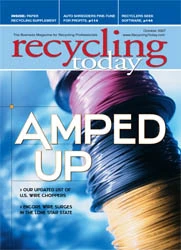The Texas Commission on Environmental Quality has issued an Air Quality Permit to Neofuels USA LLC to build a tire recycling facility in Port Arthur, Texas.
Neofuels, a wholly owned subsidiary of Ally Investments LLP, holds a license with Titan Technologies to build a tire recycling facility in Port Arthur capable of processing around 300 tons of scrap tires per day using Titan’s thermolysis process.
At full capacity, the proposed facility will be able to process about 30,000 scrap automobile tires per day, converting them into around 42,000 gallons of fuel grade oil, 90 tons of carbon black and 30 tons of steel per day.
Pennsylvania DEP Approves Scrap Tires as Fuel SupplementThe Pennsylvania Department of Environmental Protection (DEP) has approved an air quality plan for Northampton Generating Company L.P. to use scrap tires as a fuel supplement in the company’s co-generation power plant in Northampton Borough, Pa.
"We are issuing this approval after carefully reviewing results from the company’s test burns, the plan approval application and the results of a risk assessment DEP conducted on the proposal," Northeast Regional Director Michael Bedrin says. "This is an opportunity to use a safe alternative fuel and help eliminate waste tire piles from our communities."
The company submitted its plan approval application for DEP review in February and conducted a test burn using scrap tire-derived fuel. Northampton Generating presented the findings of the test burn to DEP and presented background information to the borough for consideration during the review process.
The air quality plan approval allows the company to use 105 tons of anthracite culm and other approved fuels, such as paper and wood, per hour as fuel. In that total, up to 23 tons of scrap-tires-per-hour may be used as a fuel source.
The company also is required to use enclosed trucks and unload the scrap tires in its enclosed fuels building. No chipping or shredding of tires will be conducted on the property.
The company’s fuel building also has its own air pollution controls to prevent dust from the unloading and handling processes.
FDA Approves Flakes-to-Resin ProcessGerman company Uhde Inventa-Fischer has announced its recycling process for PET post-consumer flakes has received FDA approval.
The company reports that its process, which uses up to 50 percent post-consumer flake to virgin polymer, received approval in a letter of no objection dated June 25, 2007.
The process is based on Uhde Inventa-Fischer’s 2 Reactor Melt-To-Resin process and uses two parallel streams of polymer, one virgin and one post-consumer. The flakes are molten, partially depolymerized and added to the virgin PET melt. The filtered melt can either be cut into pellets or be transformed directly into preforms for prime bottle production.
PLASTICS Coca Cola Announces Major Recycling ProjectThe Coca-Cola Co., which has been besieged by many environmentalists for its lack of recycling efforts in the past, is set to announce that it will be building what it calls the largest bottle-to-bottle recycling facility in the world near Spartanburg, S.C.
A spokesman for Coca-Cola says that the plan is for the company to open up the bottle-to-bottle recycling facility sometime next year, with the plant fully operational by 2009. The goal of the facility will be to handle around 100 million pounds of PET plastics annually. The cost of the new plant is estimated at $60 million.
The proposed project is part of a plan by Coca-Cola to recycle or reuse 100 percent of the company’s PET plastic bottles in the United States.
Coca-Cola will work with United Resource Recovery Corp. (URRI), based in Spartanburg, S.C., on the project. Coca-Cola presently has similar recycling facilities in Switzerland, Mexico, Austria and the Philippines.
Coke initiated a partnership with URRC in 1996 to accelerate the development and commercialization of newer recycling processes.
Along with the new facility, the company also said it will be expanding its business relationship with RecycleBank by providing a $2 million grant to the company to help it expand its residential recycling program. The grant will continue to drive the plan between the two partners to support environmental programs throughout the country.
Last year, RecycleBank and Coca-Cola formed the RecycleBank Donations Program. Coca-Cola has committed to match dollar for RecycleBank Reward Point and has donated to both the Ocean Conservancy and the RecycleBank Green Schools program.
The company also released a new 20-ounce contour PET bottle that uses 5 percent less PET than its predecessor and is completely recyclable.
Coca-Cola has been in discussions with representatives from Spartanburg County on the recycling facility for more than a year.
California Grocers Begin Plastic Bag Recycling ProgramAs of July 1, grocers and chain drug stores in California began providing opportunities for consumers to return clean plastic carryout bags.
The new program follows a state law signed by Gov. Arnold Schwarzenegger last year that requires grocery stores and other retailers to implement recycling programs for plastic bags. Rep. Lloyd Levine, D-Van Nuys, sponsored the legislation, known as AB 2449.
Additionally, stores will provide reusable bags for sale to customers.
The California Grocers Association says that members of the association recycled more than 2.2 billion pounds of material, including plastic, in 2005.
More information is available online at the California Grocers Association Web site www.cagrocers.com.

Explore the October 2007 Issue
Check out more from this issue and find your next story to read.
Latest from Recycling Today
- Green Cubes unveils forklift battery line
- Rebar association points to trade turmoil
- LumiCup offers single-use plastic alternative
- European project yields recycled-content ABS
- ICM to host colocated events in Shanghai
- Astera runs into NIMBY concerns in Colorado
- ReMA opposes European efforts seeking export restrictions for recyclables
- Fresh Perspective: Raj Bagaria





